-
Doctors
-
Specialities & Treatments
Centre of Excellence
Specialties
Treatments and Procedures
Hospitals & Directions HyderabadCARE Hospitals, Banjara Hills CARE Outpatient Centre, Banjara Hills CARE Hospitals, HITEC City CARE Hospitals, Nampally Gurunanak CARE Hospitals, Musheerabad CARE Hospitals Outpatient Centre, HITEC City CARE Hospitals, Malakpet
HyderabadCARE Hospitals, Banjara Hills CARE Outpatient Centre, Banjara Hills CARE Hospitals, HITEC City CARE Hospitals, Nampally Gurunanak CARE Hospitals, Musheerabad CARE Hospitals Outpatient Centre, HITEC City CARE Hospitals, Malakpet Raipur
Raipur
 Bhubaneswar
Bhubaneswar Visakhapatnam
Visakhapatnam
 Nagpur
Nagpur
 Indore
Indore
 Chh. Sambhajinagar
Chh. SambhajinagarClinics & Medical Centers
Book an AppointmentContact Us
Online Lab Reports
Book an Appointment
Consult Super-Specialist Doctors at CARE Hospitals

Colonoscopy
Colonoscopy
Colonoscopy Test in Hyderabad
A colonoscopy is a diagnostic procedure that is performed to examine the large intestine (colon) and the rectum. It can detect changes or abnormalities.
The process is done with the help of a long, flexible tube (colonoscope). It is placed into the rectum during a colonoscopy examination. The doctors at CARE Hospitals can see the inside of the colon. It is possible via the tiny video camera at the tube's tip. The scope can easily remove polyps or any other abnormal tissue. The tissue samples or the biopsies are taken for the same.
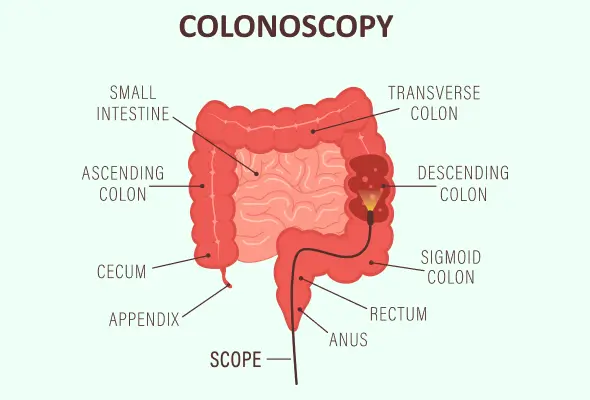
The Colonoscopy Test in Hyderabad is conducted with the help of professional experts at CARE Hospitals. Our extensive network of different medical services will make sure you get properly treated and as needed.
Risks associated with Colonoscopy
The following are the risks linked with a colonoscopy:
- A different reaction or adverse effect of the sedative given during the procedure.
- Bleeding at the site of a tissue sample (biopsy) or the removal of a polyp or other diseased tissue.
- The rectum wall or colon may have wear and tear.
Our doctors will assign proper treatment in accordance with the prior physical health. You will need to tell in advance about all the conditions.
There are a few things or problems that your exam may have:
- If your doctor is worried about the quality of the vision through the scope, a repeat colonoscopy may be recommended.
- If your doctor wasn't able to get the scope all the way into your colon, a barium enema or virtual colonoscopy may be prescribed to look at the rest of it.
Symptoms
A colonoscopy is a diagnostic exam that can foretell insights into the large intestine and related parts. The colonoscopy test is prescribed by the doctor if you encounter one or more than one of the following symptoms:
- Vomiting
- Nausea
- Digestive issues
- Constipation
- Pins-like pain in the lower abdomen
- Coloured vomit
- Bluish skin, dehydration
- Loss of appetite
- Rectal bleeding
- Discomfort at the rectum
If the symptoms are persistent and cannot be cured with the medications, you may be asked to go for a colonoscopy.
Diagnosis
The diagnosis and treatment are divided into - before, during, and after the procedure of colonoscopy. The experts who perform colonoscopy in Hyderabad at CARE Hospitals will carefully conduct the examination once detected.
Before the colonoscopy:
- You'll need to wipe out your colon before having a colonoscopy. During the exam, any residue in your colon may impede your vision of the colon and rectum.
- Diet before the exam-You won't be able to eat solid meals the day before the exam. Clear drinks, such as plain water, tea, and coffee without milk or cream, broth, and carbonated beverages, may be limited.
- Enema kit- It is used to empty the rectum.
- Medication- tell your doctor about the medications you are taking, especially if you have diabetes, high blood pressure, or heart problems.
During the colonoscopy:
- In most cases, sedation is advised. A moderate sedative is sometimes administered as a tablet. To alleviate any discomfort, the sedative is sometimes mixed with an IV pain medicine.
- The scope has a light and a tube that allows the doctor to pump air or carbon dioxide into your colon. It is long enough to reach the whole length. Carbon dioxide is found in the colon.
- You may experience stomach cramping or the urge to urinate when the scope is moved or air is inserted. All of this was recorded with the help of a videographer attached to the tube.
After the colonoscopy:
- It takes roughly an hour for the sedation to wear off after the exam. Because the sedative's full effects can take up to a day to wear off, you'll need someone to drive you home. For the rest of the day, don't drive, or return to work.
How does the colonoscopy procedure work?
- A colonoscope is a small camera with a light on the end of a long, flexible tube.
- Your doctor puts this tube through your anus and moves it slowly through your colon until it reaches where your small intestine starts.
- While it's moving through, the tube pumps air into your colon to make it bigger.
- The camera sends video of the inside of your colon to a screen.
- Your doctor watches the screen to check for anything unusual.
- When they reach the end of your colon, they pull the tube out while still watching the screen for a second look.
Interpretation of colonoscopy results
-
Results- The results can be negative or positive. It depends on the result of what the doctor recommends next.
-
If it is negative- It indicates the doctor didn't find any abnormalities in the colon.
You may be asked to repeat the colonoscopy by your doctor, if:
- you're at risk of colon cancer due to age.
- you have a history of polyps from past colonoscopy operations, you should have another colonoscopy every five years.
- there were leftover feces in your colon
If it is positive- It indicates the doctor found polyps or abnormal tissue in the colon.
- Although the majority of polyps aren't dangerous, some can be precancerous. Colonoscopy polyps are sent to a lab for analysis to determine whether they are malignant, precancerous, or noncancerous.
- You may need to follow a more rigorous monitoring program in the future to look for new polyps, depending on the size and number of polyps.
CARE Hospitals is one of the globally recognized hospitals in India, known for offering a comprehensive network of medical services, including the best colonoscopy procedure in India. All of the procedures are carried out by the best doctors in India. You may get the desired result once our consultation team reaches you. Our top-notch services are excellent in providing the best to the patient, including the best colonoscopy cost in Hyderabad or other facilities of CARE Hospitals.
Click here for additional information on the cost of this procedure.
FAQS
1. What are the advantages of colonoscopy for cancer screening over the alternatives?
Advantages of a traditional colonoscopy include:
- Enhanced Sensitivity: Colonoscopy boasts superior sensitivity, making it more adept at detecting early signs of cancer.
- Comprehensive Diagnosis, Treatment, and Prevention: Traditional colonoscopy serves as an all-encompassing approach, allowing for immediate diagnosis, treatment, and preventive measures. In contrast, other screening methods may necessitate subsequent colonoscopy if positive results are obtained.
- Longer Screening Intervals: With normal results, colonoscopy screenings are required only once every 10 years, offering extended periods between tests.
2. Are there alternative ways of screening for colon cancer?
Colonoscopy stands out among colorectal cancer screening methods due to its superior sensitivity in detecting early cancer or precancerous conditions, which is crucial for effective prevention and treatment. It uniquely combines diagnostic and therapeutic capabilities, allowing doctors to remove suspicious tissue during the same procedure.
Alternative screening options include fecal occult blood tests, which analyze stool samples for cancer-related indicators. These tests may require repetition every one to three years. A positive result typically leads to a follow-up colonoscopy and tissue biopsy. Virtual colonoscopy, a CT scan producing detailed 3D colon images, requires similar preparation to traditional colonoscopy but doesn't necessitate anesthesia and is recommended every five years.
3. How can I prepare for a Colonoscopy?
To ensure a clear visualization of your colon by medical professionals, it is imperative that your colon is completely empty. Consequently, you will be instructed to adhere to a specific diet regimen for two days preceding the procedure. Additionally, you should increase your fluid intake on the day prior to the colonoscopy.
1. Hydration: Your goal should be to consume one glass of water every hour for the two days leading up to the procedure, with a daily target of 2 to 3 liters of water, unless you have liver or kidney issues.
2. Medication Adjustments:
- Discontinue the use of any iron-containing tablets for a period of 3 to 4 days before the scheduled procedure.
- Cease taking any medications that may cause constipation for 3 to 4 days before the procedure.
- Halt the use of any diabetic medications on the night before the procedure, resuming them only after the procedure is complete.
3. Continue Regular Medications: You should continue taking your routine blood pressure and thyroid medications on the morning of the procedure, using a small sip of water at 6 a.m.
Our Doctors
-
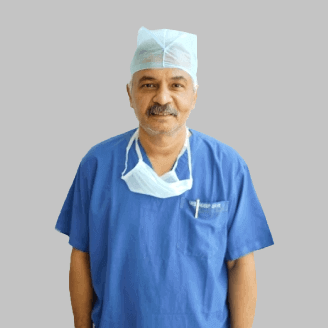
Dr. Sandeep Dave
MBBS, MS, FIAGES, FAMS
Gastroenterology – Surgical, General Surgery
View More -
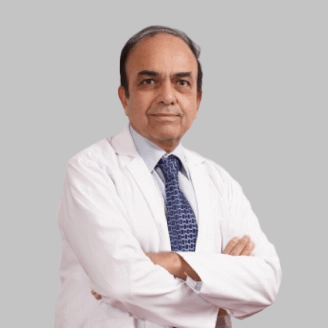
Dr. C P Kothari
MBBS, MS, FICS, FIAGES, FMAS
Gastroenterology – Surgical
View More -

Dr. Surendra Kumar Khunte
MBBS, MD Medicine, DM (Gastroenterology)
Gastroenterology Medical
View More -

Dr. Ravindra Kale
MBBS, MD (Medicine), DM (Gastroenterology)
Gastroenterology Medical
View More -

Dr. Neeraj Jain
MBBS, MD, DNB, DM
Gastroenterology Medical
View More -

Dr. A R Vikram Sharma
MBBS, MS
General Surgery
View More -

Dr. Akash Chaudhary
MBBS, MD, DM
Gastroenterology Medical
View More -

Dr. Alok Rath
MBBS, MS, FNB (Minimal Access & Surgery)
Gastroenterology – Surgical, General Surgery
View More -

Dr. Anshuman Singh
MBBS, MD (Medicine), DM (Gastroenterology - IPGMER Kolkata)
Gastroenterology Medical
View More -
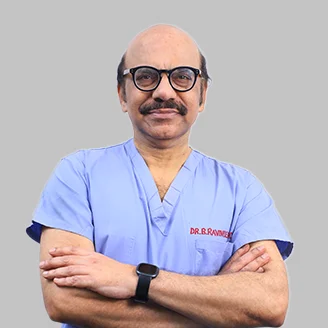
Dr. B Ravinder Reddy
MBBS, MS, FRCS (Edinburgh), FRCS (Glasgow)
Gastroenterology – Surgical, General Surgery
View More -
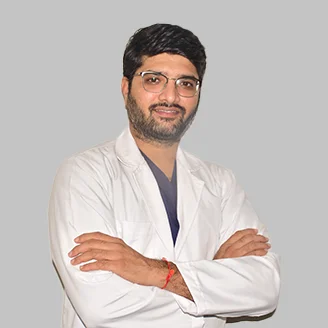
Dr. Bhageerath Raj D
MBBS, MD, DM (Gastro)
Gastroenterology Medical
View More -

Dr. Bhupathi Rajendra Prasad
MS, DNB (Superspeciality, Surgical Gastro-NIMS), FICRS (Robotic Surgery), FMAS (Minimal Access Surgery), FALS (Fellowship in Advanced Laproscopic Surgery - Oncology, Colorectal, HBP, Hernia)
Gastroenterology – Surgical
View More -

Dr. Biswabasu Das
MBBS (Hons), MS (General Surgery), MCh (Surgical Gastroenterology) (AIIMS New Delhi), Fellow (HPB SURG) (MSKCC, NY, USA)
Gastroenterology – Surgical
View More -

Dr. Biswabasu Das
MBBS (Hons), MS (General Surgery), MCh (Surgical Gastroenterology) (AIIMS New Delhi), Fellow (HPB SURG) (MSKCC, NY, USA)
Gastroenterology – Surgical
View More -

Dr. D.V. Srinivas
MBBS, MD, DM
Gastroenterology Medical
View More -

Dr. Dillip Kumar Mohanty
MBBS, MD, DNB (Gastroenterology), Fellowship in Advance Endoscopy & ERCP
Gastroenterology Medical
View More -

Dr. G. Satyanarayana
MBBS, MD (Medicine), DM (Gastroenterology)
Gastroenterology Medical
View More -

Dr. Ghana Shyam Gangu
MBBS, DNB, DM (Gastroenterology)
Gastroenterology Medical
View More -

Dr. Hitesh Kumar Dubey
M.B.B.S, M.S (Gen. Surgery), MCH-SS (G.I and HPB Surgery)
Gastroenterology – Surgical
View More -

Dr. J Vinod Kumar
MBBS, MS, FAIS, FIAGES, FMAS
Gastroenterology – Surgical, General Surgery
View More -

Dr. Jatashankar Mohapatra
MBBS, MS (General Surgery)
Gastroenterology – Surgical, General Surgery
View More -

Dr. Jawwad Naqvi
MBBS, MS, FIAGES, FMAS, FIALS
Gastroenterology – Surgical, General Surgery
View More -

Dr. Karthikeya Raman Reddy
MBBS, MD (General Medicine)
Gastroenterology Medical
View More -
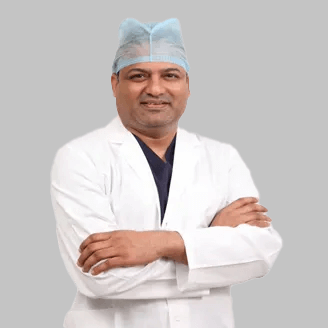
Dr. Karunakar Reddy
MBBS, MS (General Surgery), DNB (Surgical Gastroenterology)
Gastroenterology – Surgical
View More -

Dr. Lalit Nihal
MBBS, MD, DM
Gastroenterology Medical
View More -

Dr. M. Asha Subba Lakshmi
MBBS, MD (General Medicine), DM (Gastroenterology)
Gastroenterology Medical
View More -

Dr. Mustafa Hussain Razvi
MBBS, MS (General Surgery), DNB (Surgical Gastroenterology)
Gastroenterology – Surgical, General Surgery
View More -
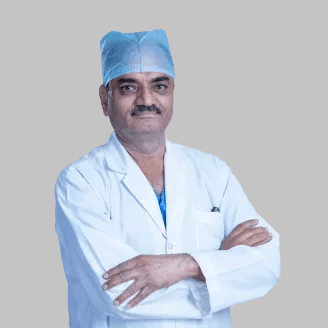
Dr. P. P. Sharma
MBBS, MS (Surgery), FAIS, FICS, FMAS, FIAGES
Gastroenterology – Surgical, General Surgery
View More -

Dr. Parvez Ansari
MBBS, DNB (General Surgery)
General Surgery
View More -

Dr. Ramsagar Vidya Sagar
MD, DM
Gastroenterology Medical
View More -

Dr. Rohan Kamalakar Umalkar
MBBS, MS (General Surgery)
General Surgery
View More -

Dr. Sandeep Pandey
MD, DM
Gastroenterology Medical
View More -
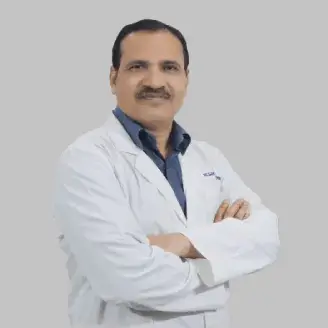
Dr. Santosh Kumar Behera
MBBS, MS (General Surgery)
Gastroenterology – Surgical, General Surgery
View More -

Dr. Saurabh Lanjekar
MBBS, MD, DNB (Gastroenterology)
Gastroenterology Medical
View More -

Dr. Siddarth Tamaskar
MBBS, MS, FMAS, FIAGES
Gastroenterology – Surgical, General Surgery
View More -

Dr. Swathi G
MD (General Medicine), DM (Gastroenterology)
Gastroenterology Medical
View More -

Dr. Tapas Mishra
MS, FIAGES, FMAS, DIPMAS (Bariatric)
General Surgery, Laparoscopic and Bariatric Surgery
View More -

Dr. Venugopal Pareek
MBBS, MS, DNB, FMAS, FIAGES, FAIS
Gastroenterology – Surgical, Laparoscopic and Bariatric Surgery
View More -

Dr. Vinit Kahalekar
MBBS
Gastroenterology Medical
View More
Frequently Asked Questions
Still Have a Question?

